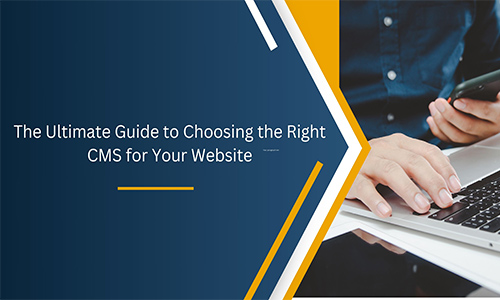In the dynamic landscape of website development, selecting the right Content Management System (CMS) is a crucial decision that can significantly impact your online presence. A CMS serves as the backbone of your website, influencing its functionality, scalability, and ease of maintenance. Here’s your comprehensive guide to navigate the maze of options and make an informed choice:
1. Define Your Website Goals: Clearly outline your website’s purpose, content needs, and future growth expectations. Whether it’s a blog, e-commerce site, or corporate platform, understanding your goals will shape your CMS requirements.
2. Assess Ease of Use: Opt for a CMS with an intuitive interface. User-friendly platforms streamline content updates and empower non-technical users to manage the site efficiently. Conduct demos or trials to evaluate usability.
3. Content Flexibility: Ensure the CMS accommodates various content types – text, images, videos, and interactive elements. Flexibility is key to adapting to evolving content strategies.
4. Scalability: Choose a CMS that grows with your business. Consider future expansions, additional features, and increased traffic. Scalability prevents the need for a CMS overhaul as your website evolves.
5. Customization Options: Assess the level of customization offered. A robust CMS should allow you to tailor the design, layout, and functionality to align with your brand and unique requirements.
6. SEO-Friendly Features: An effective CMS should support SEO best practices. Look for features like customizable URLs, meta tags, and image optimization tools to enhance your website’s search engine visibility.
7. Security Measures: Prioritize security features to safeguard your website and user data. Regular updates, secure authentication protocols, and data encryption are fundamental aspects of a secure CMS.
8. Mobile Responsiveness: With the prevalence of mobile users, ensure the CMS supports responsive design. Your website should deliver a seamless experience across various devices.
9. Third-Party Integrations: Evaluate the CMS’s compatibility with third-party tools and integrations. Whether it’s social media, analytics, or e-commerce plugins, a versatile CMS enhances functionality.
10. Community and Support: Check for an active user community and reliable support services. An engaged community often means continuous improvement and readily available resources for troubleshooting.
Conclusion: Choosing the right CMS is pivotal for a successful online presence. By aligning your website goals with the features offered by different CMS options, you can make an informed decision that sets the foundation for a scalable, secure, and user-friendly website. Regularly reassess your needs to ensure your chosen CMS continues to meet your evolving requirements.

